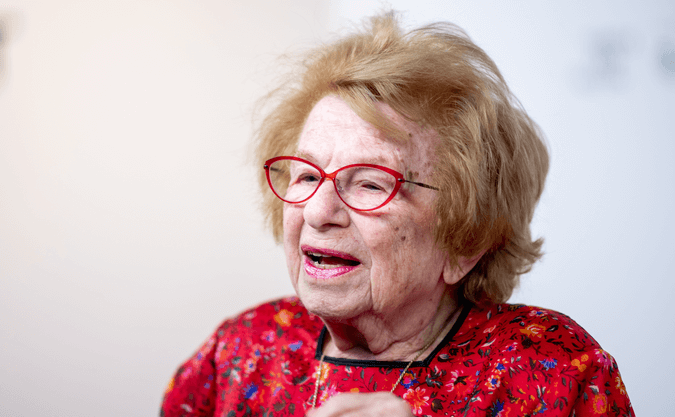Dr. Ruth still has plenty to say about your sex life
Dr. Ruth Westheimer remains the world’s best-loved sex therapist at 95. Now working on a new project about loneliness, she reflects on 50 years of helping people have better sex

Noted author and icon Dr. Ruth K. Westheimer. Photo by Getty Images
This article originally appeared on Haaretz, and was reprinted here with permission. Sign up here to get Haaretz’s free Daily Brief newsletter delivered to your inbox.
Dr. Ruth Westheimer is busy.
When I call up the 95-year-old sex therapist, she has someone over at her New York City home to work on her latest project, but she still finds 20 minutes to talk to me.
“I’m very busy, as you can see. But I’m very glad you called because I like to be busy. I’m doing a new project – it’s about loneliness” she explains. “But otherwise, I have friends who come. I’m not going out much.”
She notes that despite her packed schedule, she’s made time for the Haaretz interview – and to attend the U.S. Open Tennis Championships, as she does every year. Her German-accented voice is still the matter-of-fact but inviting one who has no qualms about discussing the finer points of intercourse.
Dr. Ruth has been a household name for decades. A stint working at Planned Parenthood in Harlem started her on a path to teaching the world the ins and outs of lovemaking. After training in sex therapy at Cornell Medical School with the late Dr. Helen Singer Kaplan (whom she describes as “the best sex therapist”), in 1980 she launched her media career with the radio program “Sexually Speaking,” giving straightforward answers to bashful callers’ questions.
Her humor, candor and good advice – contrasted with her particularly Jewish grandmotherly and diminutive frame – caused her star to rise. She became a television mainstay in the ’80s, and spread her message far and wide: have good sex. Since then, she has written dozens of books (many of them, she notes, have been translated into Hebrew) and has not seemed to stop moving.
These days, she lives “all the way up in Washington Heights, where many of the German Jews and Austrian Jews settled, because it looks very European. I’m overlooking the Hudson, and I’m right next to Fort Tryon Park. And there is now a tulip named after me! Because the tulip came from Holland, and the tulip is short, and vibrant. There is a sign next to it, ‘Dr. Ruth’s Tulips!’”
And how did it feel to get her very own tulips? “WONDERFUL!” she says, with palpable joy.
She also finds time to keep abreast of the news in Israel. “And I’m very happy to talk to Haaretz! I remember getting paper [copies of] Haaretz in my time in Israel.”
‘I don’t do politics’
Dr. Ruth was born Karola Ruth Siegel in 1928, in Germany. As part of the Kindertransport, she was brought to Switzerland at age 10, and made her way to Israel – then British Mandatory Palestine – six years later. There, the diminutive teen served in the pre-state Haganah militia, where she was famously a sniper.
“Anybody who has lived in Israel, anybody who has been in the Haganah, like me, anyone who was wounded in 1948 – on my 20th birthday, which you can read in the autobiography, which is also in Hebrew – knows that once you are involved in Israel, you’re passionately interested,” she says.
But when it comes to the current state of the country, she is not prepared to comment.
“I don’t live there,” she notes, but qualifies: “It’s not that I’m not worried about what’s happening in the world – and in Israel – but I’m not a politician. I’m an educator … I don’t do politics. But I’m worried, because I don’t want anyone to get hurt. As you know, I was in Israel from 1945, until I came here on a visit – and look what happened: I stayed here and they made me be Dr. Ruth,” she laughs.
“I used to go to Israel every single year, teaching about issues of sex education and sexuality,” she says, adding that the questions she would field in Israel were rather universal. “The questions are not different from the questions I got from Europe, from America – and in those days there were very few sex educators like me who could talk in Hebrew, and who were well-trained. I was very fortunate.”
Israel, it seems, reciprocates her passion. She was awarded an honorary doctorate by Ben-Gurion University of the Negev in 2021 – an honor she is proud of. “That makes me feel 6 feet tall,” she says.
But, she says, she no longer makes her annual visits. “Now I let younger people do those trips. But I talk a lot over the phone, so I’m very happy to talk to you, Haaretz.”
On the line with her, it seems there is no question she has not already fielded in her decades of work. She has an immediate answer for every query, and knows exactly when to plug her many publications. She regularly tells me to underline certain concepts, and carefully reiterates her main points. Her media savvy doesn’t seem self-serving; instead, it suggests an educator who absolutely needs the readership to understand and internalize her message.
Israelis are anxious about this time of upheaval and uncertainty [concerning the extremist government]. How do we keep our sex lives going strong? How do we keep that passion?
“By first of all being sexually knowledgeable, by knowing how to satisfy your partner, to make sure that sex is not boring but varied, and to be sure to say that even in difficult times, it’s very important to keep your sex life alive,” she says, then pausing. “It’s a very nice sentence for Haaretz.”
You’ve been talking about sex and love for about 50 years. Do you think we’re in a better place than when you started out?
“Yes. Certainly. There are less women who don’t know how to be orgasmic. There are less women who don’t know how to make sure their sex is varied and not boring, and know to make time, even in such difficult times, to make sure there is a good sexual relationship with your partner.”
Before I can ask about what, if anything, men have learned, she says as an aside: “That’s another nice sentence for Haaretz.” She pauses and adds: “I like when you giggle.”
You’re really good at making me giggle.
“Because it’s a Jewish tradition! It says: a lesson taught with humor is a lesson retained. So I try to use some. Humor – not stupid jokes – but some humor, to remind people to be sexually active.”
‘Underline the word varied’
I ask her if there is any advice she’s surprised she still has to give nowadays. “I do hear that I have to reinforce my message about not putting sex on the back shelf, but to make sure to keep time and interest in your partner, even in difficult times. Another good sentence for Haaretz.”
I feel like you missed a calling. You could have been a journalist too.
It’s her turn to giggle. “That’s a nice thing to say, thank you. But I think I’ll be the talker and you be the journalist.”
Her newest project, she says, will be relevant to Israel as well. “It’s about people who are isolated, and about people who have to make sure that they keep their sex lives alive and varied – underline the word varied – so it does not become boring. Not the same position all the time, and tell your partner today how lucky you are to have that partner in your life! See how carefully I say that? Partner – man or woman, it doesn’t matter. To have that partner in your life.”
My generation – millennials – is said to struggle with loneliness a lot, especially after the pandemic.
“Right. And people need to be aware of it, and you journalists need to write about it, and people need to make an effort to find a new partner if their old partnership does not work anymore. Hopefully there are no children involved – but let’s make sure the partnership is productive and varied. Read some books on sex. It doesn’t have to be mine, there are many other books around – but mine are pretty good.”
Do you have any advice for millennials and Gen Z, today’s youth, about sex?
“Never be embarrassed about asking about sex. People have to be able to be what I call ‘sexually literate.’ They have to know how to satisfy their partner, and that needs some courage to ask the questions. Not during sex, but afterwards. During sex, most people want quiet. But afterwards, they can ask, ‘Was there something I could have done for you to make sex better?’ To make sex better. Not boring!”
She takes this opportunity to plug another book – also out in Hebrew – “Sexuality and the Jewish Tradition.”
“For us Jews, it is perfectly permissible and desirable to talk and teach about sex. They would like people to be married, that’s true, but it’s perfectly alright to talk to married couples about making their sex lives as wonderful as possible,” she says. “We have to remind the Jews that, for Jews, sex has never been a forbidden subject.”
How does it feel to have started a conversation about sex for so many people?
“It feels very good. Now, I’m only four-foot-seven. But when I talk to Haaretz – and to you – about sex, I seem 6 feet tall! Write that down. I don’t feel like four-foot-seven.”
***
Nine of Dr. Ruth’s top sex tips, as told to Haaretz over the years
1. “For Jews, sex has never been a sin”
2. “You can have a whole soccer team in bed with you in your imagination”
3. “Freud should have taken a class with me”
4. “Never be embarrassed about asking about sex. Not during sex, but afterwards. During sex, most people want quiet”
5. “It’s impossible to have sexual relations and look at the phone at the same time”
6. “When they asked me once about sex with an animal, I said that I’m not a veterinarian. Period”
7. “People who are very tight with money can’t be good lovers”
8. “Make sure that sex is not boring but varied. Even in difficult times, it’s very important to keep your sex life alive”
9. “Even though I talk about erections and orgasms all day, deep inside I’m a yekke from Frankfurt”
















